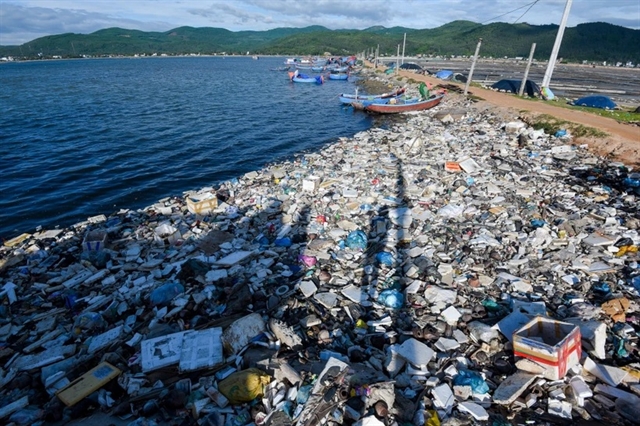 Life & Style
Life & Style

 |
| Plastic waste in a lake that tarnishes the beauty of landscape, hampering tourism. — VNA/VNS Photo |
HÀ NỘI — Việt Nam’s tourism sector is taking significant strides towards environmental sustainability as all Vietnam Tourism Association (VITA) members pledge to eliminate single-use plastics and integrate plastic waste reduction into operational policies by 2030.
According to VITA Chairman Vũ Thế Bình, while tourism is highly affected by plastic waste pollution, it is also a significant contributor to the issue. He cited the pledge as a catalyst for a plastic-free tourism sector.
"Tourism businesses' active participation in reducing plastic waste is the key to achieving sustainable development goals," Bình said.
Since 2018, the association has launched initiatives such as 'Vietnam Tourism Joins Hands to Reduce Plastic Waste' and 'Plastic Waste Reduction in Tourism,' and introduced a certification system for 'plastic-free tourism businesses.'
The initiatives have yielded remarkable results. In Hội An, for example, plastic waste volume at hotels dropped by 64 per cent within three months of implementing the campaigns.
By 2025, three-fourths of VITA members aim to enhance awareness of plastic waste issues, while all tourist sites, restaurants and hotels plan to eliminate non-biodegradable plastic bags and single-use plastics. Half of tourism businesses are expected to implement guidelines for reducing plastic waste by the years' end.
By 2030, 100 per cent of VITA members are committed to removing single-use plastics and embedding waste reduction measures in their regulations.
VITA also plans to strengthen international cooperation, foster technology transfer and share experiences to promote sustainable tourism.
Chairperson of the Ninh Bình's Tourism Association, Dương Thị Thanh, highlighted the province's success in the 'Plastic Waste Reduction in Tourism' initiative, which has led to a 23 per cent decrease in plastic waste at hotels, 14 per cent at restaurants and 20 per cent at tourist sites.
"Many tourism businesses have taken steps to combat plastic pollution, especially single-use plastics. This is a very positive sign of changing attitudes and actions within Ninh Bình's tourism community," Thanh said.
However, Thanh noted several challenges remain, including high initial costs for replacing plastic items with eco-friendly alternatives, inconsistent implementation of waste reduction measures and the persistence of visitors bringing plastic waste into tourism sites.
To address these issues, the tourism association outlined six key priorities, including raising public and tourist awareness, developing green tourism products and mobilising international resources to advance plastic waste reduction efforts.
The association also launched a plastic waste management app, providing a reporting system to track the collection and disposal of plastic waste. It played a key role in certifying 'plastic-free tourism businesses' under the association’s criteria, encouraging companies to adopt more sustainable practices. — VNS




